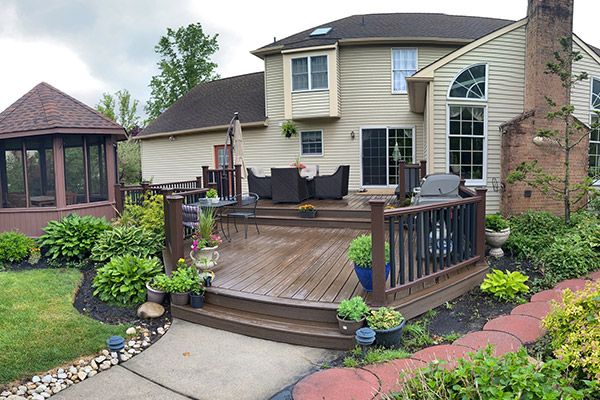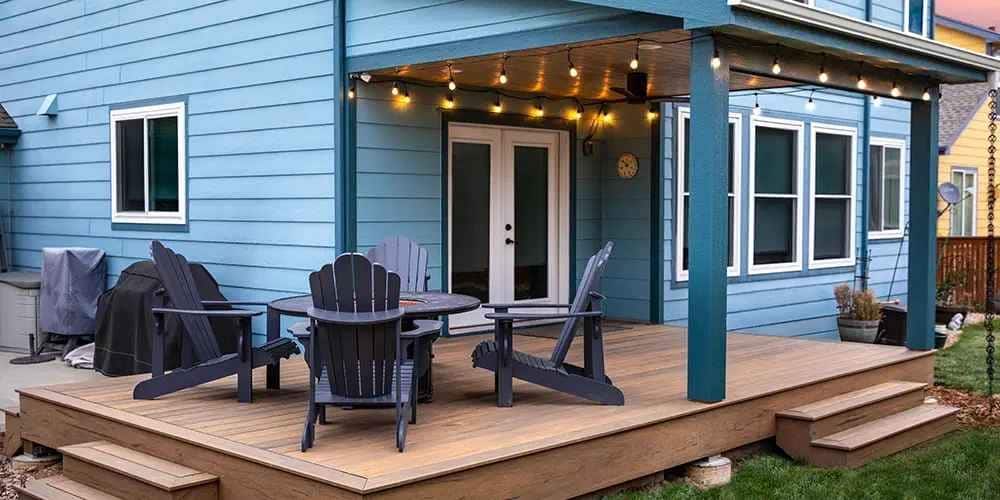Checking Out Numerous Types and Advantages of Deck: A Comprehensive Overview
The outdoor deck is greater than simply an expansion of one's living room; it's a testament to personal style, a location for celebrations, and a sanctuary to relax. The choice of decking material substantially affects these facets, with alternatives varying from the traditional attraction of timber to the usefulness of composite, and the resilience of aluminum. Understanding the subtleties of these products is necessary, so let's begin our expedition, one deck kind each time.
Comprehending the Fundamentals of Decking Material
Decking material serves as the foundation of any kind of deck task, determining the general appearances, sturdiness, and performance of the final item. The marketplace offers a large array of materials, each with unique features matched to different design choices and environmental conditions. The selection consists of natural timber, composite, plastic, aluminium, and also concrete. Wood, being the traditional selection, provides a classic, timeless charm. Composite, a combination of timber and plastic, provides wood-like aesthetics with much less upkeep. Plastic and aluminium offer contemporary, minimalistic alternatives, while concrete is preferred for its unrivaled toughness. The option of material dramatically affects the deck's lifespan, maintenance needs, and resistance to elements. Comprehending the fundamentals of outdoor decking material is crucial for an effective deck task.
Benefits and Disadvantages of Timber Decks
In reviewing deck types, recognizing the advantages and disadvantages of wood decks comes to be critical. This entails thinking about aspects such as the sort of timber picked and its effect on the deck's efficiency. The succeeding conversation will certainly discover these points thoroughly to offer a thorough sight of the benefits and disadvantages connected with timber decks.

Timber Deck: Pros & Disadvantages
The appeal of timber decks can not be overemphasized. They show a timeless charm and warm aesthetic that lots of home owners find tempting. This natural product is flexible, permitting a series of design opportunities, and can supply an outstanding return on investment.
Nonetheless, timber decks also feature specific downsides. They require regular maintenance, consisting of regular cleansing, staining or paint, and potential substitute of warped or rotten boards. Wood is likewise vulnerable to damage from insects and harsh climate condition. Its long life can be much less than various other decking products, particularly otherwise appropriately cared for.
Selecting Your Timber Type

Exploring the Benefits of Compound Decking
Transforming focus to composite decking, it uses distinct benefits. Its durability exceeds typical timber in severe climate problems, decreasing the requirement for constant maintenance. It offers a pleasing aesthetic charm with variable layout alternatives.
Compound Decking Resilience Benefits
Despite the variety of outdoor decking choices available out there, composite decking sticks out for its toughness. This sort of decking, made from a blend of timber and plastic, gives a resistant, durable platform immune to components that generally deteriorate various other materials (Deck Builders Near Me). It doesn't warp, splinter, or crack, making sure a consistently smooth surface area for years. In addition, it's immune to damage from parasites such as termites, adding to its longevity. The integral resistance to fading, discoloration, and scraping is another notable benefit. This makes it an optimal selection for outside spaces or high-traffic areas exposed to extreme weather condition problems. In recap, the durability advantages of composite decking give a sustainable, affordable service for exterior home.
Upkeep of Composite Decks
Along with resilience, composite outdoor decking flaunts a major advantage in terms of upkeep. Unlike typical timber decks, composite decks are not vulnerable to rot, warp, or insect damage, therefore considerably lowering the need for routine repair services and replacements. They additionally call for no sanding, discoloration, or painting, making them a time-saving check that option for property owners. Cleaning a composite deck is a straightforward job, frequently just calling for a move or a mild clean with a light soap and water. The low-maintenance nature of composite decks not just gives simplicity of upkeep but also contributes to their long-term cost-effectiveness. This practical advantage, incorporated with the material's intrinsic resistance to weathering and degeneration, makes composite outdoor decking a favored choice for numerous individuals seeking a hassle-free and resilient decking solution.
Visual Charm and Variability

The Rising Appeal of Aluminum Decks: Why Select Them?
As the demand for low-maintenance and sturdy decking surges, aluminum decks are significantly ending up being the best choice for numerous homeowners and builders. These decks, made from a light-weight yet sturdy metal, offer numerous advantages over typical wood or composite decks. To begin, aluminum is normally immune to the aspects, suggesting it won't warp, crack, or discolor over time. This makes it a cost-efficient choice in the future. Furthermore, its non-porous surface area prevents the growth of fungis, molds, or pests, making sure a clean and healthy and balanced outside room. Aluminum decks are likewise eco friendly, as they are frequently made from recycled products and can be reused once more at the end of their life expectancy. Finally, their streamlined and modern aesthetic charm fits well right into modern home layouts.
Maintenance Tips for Different Decking Materials
All-natural timber decks need regular tarnishing or securing to avoid weather damage, while composite decks require routine cleansing with soap and water to get rid of spots and debris. Understanding these maintenance needs is critical for deck owners to maximize their investment and keep their decks looking their finest for years to come.
When Picking Your Deck Kind, variables to Take Into Consideration.
What factors should one consider when choosing the kind of deck to install? The first element to take a look at is the environment. Specific materials are more long lasting in specific weather. For example, composite decks resist moisture well, making them ideal for moist or stormy areas. The property owner's way of living need to likewise influence the decision. If they delight in outdoor entertaining, they might choose a sizable, sturdy wood deck. Cost is another substantial factor. While some might prefer an extravagant, exotic wood deck, budget plan constraints could require a more affordable selection like pressure-treated timber. Finally, maintenance demands need to be assessed. Decks needing less upkeep, like plastic, can be useful for busy home owners. Hence, climate, way of life, price, and upkeep are vital considerations in deck selection.
Final thought
Finally, outdoor decking materials substantially vary, each offering distinct advantages that accommodate various home owner requirements. Wood decks bewitch with all-natural beauty, while composite and aluminum ranges supply resilience and low upkeep. Trex Deck Builders Near Me. Nevertheless, the most effective choice relies on individual lifestyle, environment, and budget. Prior to devoting to a specific deck kind, house owners should carefully take into consideration the advantages, drawbacks, and upkeep demands of each i loved this product.
In reviewing deck Website types, comprehending the pros and disadvantages of timber decks becomes essential.Regardless of the myriad of decking choices readily available in the market, composite outdoor decking stands out for its resilience. Unlike conventional timber decks, composite decks are not prone to rot, warp, or insect damage, hence considerably minimizing the requirement for normal repairs and replacements. These decks, made from a light-weight yet strong metal, provide a number of advantages over traditional timber or composite decks. Natural wood decks call for regular discoloring or securing to protect against weather condition damages, while composite decks need regular cleansing with soap and water to get rid of stains and particles.